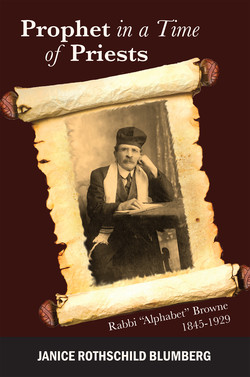Prophet in a Time of Priests

Реклама. ООО «ЛитРес», ИНН: 7719571260.
Оглавление
Janice Rothschild Blumberg. Prophet in a Time of Priests
Отрывок из книги
Advance Praise
“This warts-and-all biography recounts the strange-but-true story of one of America’s most colorful, accomplished, and eccentric religious leaders, Edward Benjamin Morris (“Alphabet”) Browne. At once a rabbi, a doctor, and a lawyer, Browne befriended Ulysses S. Grant, bested the atheist preacher Robert Ingersoll, corresponded with Theodor Herzl, and sprang innocent men from jail. Acquainted with many of the leading figures of his day, he championed causes both great and small, and occupied pulpits from Boston to Peoria. Few recall Browne today, but as this prodigiously researched volume demonstrates, they should. His life illuminates significant chapters in the history of American Judaism.”
.....
Although he did not study English before coming to America and later claimed to have had little fluency in it during his initial stay in Cincinnati, Browne made himself understood well enough by members of the Hesperian literary society of the Ohio Female College for them to invite him to contribute to their publication, The Hesperian Gazette. He obliged by submitting a number of humorous, romantic verses. In 1869, Browne inscribed these poems along with others in a 276 page handwritten album entitled “Floral House Weeds,” which he dedicated to Wise and presented to him and Theresa on their twenty-fifth wedding anniversary. Browne’s first body of work in English, it also included four items in other languages that Wise understood—one in Hebrew, one each for Rabbi and Mrs. Wise in German, and a translation of Lord Byron’s “Maid of Athens” in Hungarian. The verses were mostly romantic and about women, probably tongue-in-cheek. One that was both serious and touching he dedicated to his sister Ilona.21
Despite a disclaimer that his views, “religious or otherwise, should by no means be inferred from these writings,” they often foreshadow issues that he would espouse in the future. In one that suggests the rising voice of organized labor, which he vigorously supported as the movement grew, he seemed to be scolding those who demanded higher wages without having earned them.
.....